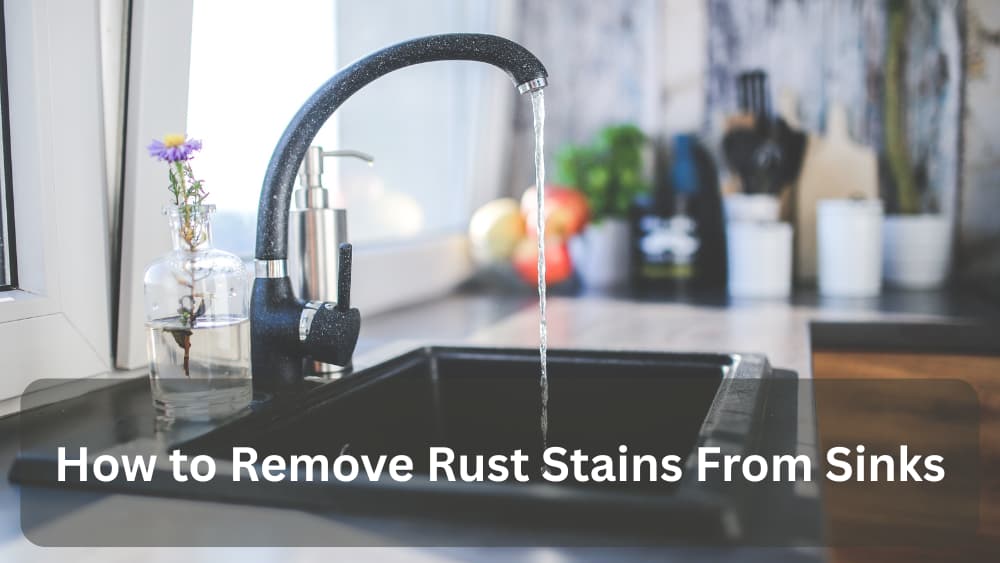Rust stains on sinks are an eyesore. They can make even the cleanest kitchen or bathroom look neglected. While stainless steel, porcelain, and ceramic sinks are designed to resist staining, rust can still develop from iron-rich water, old plumbing, or even metal cookware left to soak. The good news is that most rust stains are surface-level problems that can be safely removed with the right cleaning techniques.
This guide will walk you through why rust stains appear, the safest methods to remove them based on sink material, and how to prevent them from coming back. By the end, you’ll know how to restore your sink to a spotless shine — without damaging the surface.
Key Takeaways
- Rust stains are usually caused by iron deposits in water or metal objects left in a damp sink.
- The best cleaners depend on sink type: baking soda paste for stainless steel, hydrogen peroxide for porcelain, lemon juice + salt for ceramics.
- Avoid harsh abrasives and bleach — they can damage protective coatings and make sinks more prone to future staining.
- Prevent rust by drying sinks daily, using sink mats, and treating hard water issues.
- Regular cleaning and protective coatings keep sinks rust-free for longer.
Why Do Rust Stains Form in Sinks?
Even though sinks are made to resist corrosion, certain conditions encourage rust:
- Iron-rich water: If your water supply has high iron content, stains form when droplets dry.
- Old pipes or fittings: Corroding plumbing components can leach rust into the sink.
- Metal cookware and cans: Leaving cast iron pans, steel wool, or tin cans in the sink overnight allows rust to transfer.
- Scratched protective coating: Porcelain and enamel sinks with surface scratches expose the underlying metal.
- High humidity: Bathrooms and kitchens with poor ventilation allow moisture to linger, making rust more likely.
Understanding the source helps you both remove the stain and prevent its return.
What Tools and Supplies Work Best?
Here’s a starter kit for safe rust removal:
- Soft sponges and microfiber cloths
- Nylon brushes or old toothbrushes
- Baking soda
- White vinegar (use with caution near stone counters)
- Lemon juice and table salt
- Hydrogen peroxide (3%)
- Cream of tartar
- Non-abrasive cleaners (oxalic acid gel-based like Bar Keeper’s Friend)
- Rubber gloves
- Paper towels or soft rags
Avoid steel wool and chlorine bleach — they make the problem worse over time.
How to Remove Rust From Stainless Steel Sinks
Stainless steel is tough but not indestructible. Abrasives can scratch it, and bleach can corrode its protective layer.
Step-by-Step Cleaning
- Rinse and dry the sink to remove loose particles.
- Apply baking soda paste: Mix baking soda with a little water until thick. Spread over the stain.
- Scrub gently with the grain using a nylon brush or sponge. Never scrub in circles.
- Rinse thoroughly with warm water.
- If the stain lingers, apply a non-abrasive oxalic acid gel cleanser. Let sit for 1–2 minutes, then scrub lightly with the grain.
- Dry and buff with a microfiber cloth to restore shine.
Pro Tip: For minor rust specks, rubbing with a slice of potato dipped in baking soda can also lift the stain naturally.
How to Remove Rust From Porcelain Sinks
Porcelain sinks are smooth but prone to surface staining if chipped or scratched. Rust stains often show up as orange or brown streaks.
Safe Cleaning Method
- Sprinkle baking soda directly over the stain.
- Pour a few drops of hydrogen peroxide onto the baking soda.
- Let it fizz and sit for 5–10 minutes.
- Gently scrub with a non-abrasive sponge.
- Rinse with warm water and dry thoroughly.
For stubborn stains:
- Mix cream of tartar + hydrogen peroxide into a paste.
- Apply to the stain, let sit 30 minutes, then scrub gently.
Avoid bleach, which can weaken porcelain glaze and create permanent etching.
How to Remove Rust From Ceramic Sinks
Ceramic sinks are durable but porous enough to absorb stains if not sealed well.
Natural Solution
- Sprinkle salt over the rust spot.
- Squeeze fresh lemon juice onto the salt until it forms a paste.
- Let the mixture sit for 20–30 minutes.
- Scrub gently with a sponge or cloth.
- Rinse thoroughly and dry.
For extra power, repeat the process or add a drop of dish soap to the lemon-salt paste.
Quick Natural Remedies for Rust Removal
- Vinegar soak: Place a vinegar-soaked cloth over the stain for 10 minutes, scrub gently, and rinse. (Not for marble or natural stone counters — acids etch them.)
- Potato trick: Cut a potato in half, sprinkle with baking soda, and rub directly on the rust.
- Club soda: Carbonation helps loosen rust; pour onto the stain and scrub lightly.
These eco-friendly methods are safe for most sinks but always test on a small area first.
Commercial Rust Removers — When Should You Use Them?
Sometimes natural remedies aren’t enough. For severe or old rust stains:
- Use a non-abrasive oxalic acid-based cleaner (like Bar Keeper’s Friend).
- Apply with a damp sponge, let sit for 1–2 minutes.
- Scrub gently, rinse thoroughly, and dry.
Only use products labeled safe for your sink type. Follow manufacturer instructions carefully and ventilate the area.
Preventing Rust Stains in the Future
Cleaning is half the battle; prevention keeps sinks spotless longer.
Daily Habits
- Rinse and dry the sink after use. Standing water encourages rust.
- Don’t leave cookware or cans in the sink overnight.
- Use a sink grid or mat to avoid metal contact.
Long-Term Fixes
- Install a water softener or iron filter if your water is rich in minerals.
- Repair chips in porcelain or enamel promptly with sink repair kits.
- Polish stainless steel monthly with a food-safe oil or stainless cleaner to reinforce protection.
Troubleshooting Stubborn Rust
- If stains reappear quickly: Test your tap water for iron levels — you may need a filtration system.
- If stains spread: Check for corroding pipes or fittings; plumbing repairs may be required.
- If scratches trap rust: Professional refinishing might be needed for old sinks.
Safety Tips
- Always wear gloves when working with acids or commercial cleaners.
- Ventilate the area when using chemical-based products.
- Never mix bleach and vinegar — the combination releases toxic gas.
- Rinse thoroughly after cleaning to prevent residue buildup.
FAQs
Can I use bleach to remove rust stains from my sink?
No. Bleach reacts with metal and can worsen rust or damage protective coatings.
How often should I deep-clean my sink?
A quick wipe daily and a weekly deep clean are enough for most homes. Treat rust as soon as you see it.
Do stainless steel sinks rust permanently?
Usually not. Most rust on stainless steel is surface-level and removable with proper cleaning.
What’s the best natural remedy?
Lemon juice and salt work well on ceramic sinks, while baking soda paste is safest for stainless steel.
Should I call a professional?
If rust is widespread, linked to plumbing corrosion, or won’t lift after several attempts, it’s best to consult a plumber or refinishing expert.
Rust Removal Cheat Sheet
| Sink Material | Best Rust Removal Method | Avoid |
|---|---|---|
| Stainless Steel | Baking soda paste, oxalic acid gel | Steel wool, bleach |
| Porcelain | Baking soda + hydrogen peroxide | Harsh abrasives |
| Ceramic | Lemon juice + salt | Strong acids |
| All types | Vinegar (spot use), natural scrubs | Leaving metal objects in sink |
Final Thoughts
Rust stains in sinks may look permanent, but with the right cleaning methods, they’re usually easy to fix. The key is choosing a solution that matches your sink material, applying it gently, and rinsing thoroughly. Just as important is prevention: dry your sink daily, avoid leaving cookware inside, and address water quality issues.
By combining natural remedies, occasional commercial products, and smart maintenance, you’ll keep your sink free of rust stains and shining like new.

As the chief content writer, Hassan Al Sarker works as a professional kitchen-based content creator at Kitchen Liker.
In addition to reviewing the content published on Kitchen Liker, he ensures that it is accurate, relevant, and helpful. As a result, all the reviews and information published at Kitchen Liker are neutral and userfriendly.
Hassan Al Sarker has a bachelor’s degree in Hotel and Tourism Management From the Newyork University. Before joining Kitchen Liker, he was a contributor at Kitchen Club, United States.

